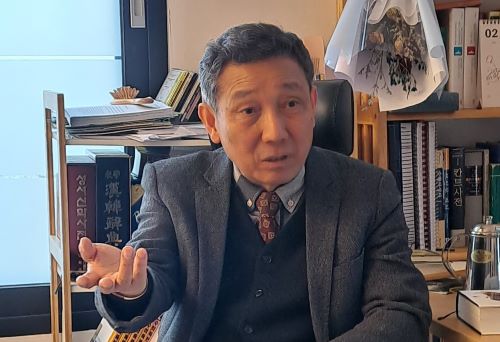On Feb. 27, Emeritus Professor Kim Sang-bong retired from the Department of Philosophy at Chonnam National University (CNU) after two decades of service. As suggested by his nickname, “Street Philosopher,” he has engaged with both academia and civil society. The Chonnam Tribune featured this interview to reflect on his journey and explore his distinctive academic world. – Ed.

You retired this February. How do you feel about concluding your academic journey at CNU?
I feel immense gratitude both for my time at CNU and my departure. I am especially thankful to former CNU President Kang Jung-chae and my senior colleagues in the Department of Philosophy, including Professor Kim Yang-hyun. I am also grateful to all the members of CNU who have helped and supported me in many ways up until my retirement.
What led you to major in philosophy?
Philosophy was not something I chose, rather, it chose me. It feels like a spiritual addiction. I feel happy when I study philosophy, and I continue to do so as though I would not survive without it.
Your journey to becoming a professor was not smooth. What were you doing before joining CNU?
Before coming to CNU, I was a professor in the Department Philosophy of Religion at Korean Christian (KC) University. However, I lost my position due to the merger of departments. Afterward, I gave lectures at institutions such as the Academy of Literature and Arts, and the Academy of Philosophy. I was also actively involved in organizing a civic group called “Society without Academic Cliques.”
It seems that you are cautious about academic cliques. Why do you advocate dismantling them?
There are two reasons. First, in a democratic society, it is absurd to push people who are born free into unequal hierarchies. Second, academic cliques create a groundless sense of superiority and inferiority, leaving students burdened with trauma. This kind of system plainly idiotizes people. That is why I am doing this.
What is the main problem that you have examined in your philosophical work?
My focus has been the subjectivity of philosophy, specifically, the concept of “allelo subjectivity.” Fundamentally, it is the realization of philosophy’s subjectivity.
What is allelo subjectivity? Could you explain it in more detail?
To understand allelo subjectivity, I will first define the antithesis of allelo subjectivity: mono subjectivity. Philosophy is self-consciousness, and the self means subjectification. Depending on how we understand the subject, our self-knowledge and understanding of the world vary. In Western society, mono subjectivity is centered on self-identity and self-relation, as well as a concept of egocentrism that has characteristics of narcissism and exclusion. The imperial era of conquest and exploitation is a fundamental example.
So, allelo subjectivity and mono subjectivity are opposites?
Exactly. Allelo subjectivity is the realization that I become who I am only through you. Subjectivity emerges from encounters between me and you. Allelo subjectivity is the subjectivity created by encounters with the otherness-oriented subject which strengthens solidarity. It is an alternative to the insular concept of mono subjectivity. While mono means “single” or “alone” in Greek, allelo signifies “mutual.”
As a professor and as a researcher of philosophy at CNU, which memory stands out the most?
In the year following my appointment, I remember when I presented a paper on the May 18 Democratization Movement with undergraduates at a May 18 Seminar. It was the turning point that set me on the path to become a “May 18 philosopher.”
What does the May 18 Democratization Movement mean to you?
One of my research areas is the philosophical interpretation of Korea’s popular uprisings. I highly value these uprisings and the May 18 Democratization Movement, in particular through the lens of allelo subjectivity, as their history emerged in response to the suffering of others. This perspective changed my standard for the future of human beings.
What do you see as the most urgent philosophical challenges facing Korean society?
The most pressing challenge is recognizing the subjectivity of thought or fostering the power to think independently. In this academic clique society, Koreans’ critical thinking is declining in general due to a flawed, score-oriented education system. The state of confusion which has occurred in the times of martial law and impeachment is a sign of critical reflection.
What are your plans after retirement?
I plan to study Kant’s Critique of Pure Reason and give lectures on it in Jeju. In August, I will host a philosophy camp in Jeju with students from Sophia School, a philosophy-focused alternative school in Gwangju. I cannot miss doing covering the Jeju April 3 Incident.
Do you have any final words for CNU students?
CNU is the university of May 18. To those who enter the CNU campus, I want to remind you of this: The ground you are standing on is sacred ground.
By Choi Daniel, Editor-in-Chief

